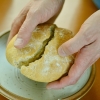주님의 상에 나아감
-
 관리자
관리자 - 12998
- 0
아래 자료의 출처는 https://shepherdingwords.com 입니다.
Coming to the Lord’s Table
주님의 상에 나아감
December 13, 2022
2022년 12월 13일
The Lord Jesus in the night in which He was betrayed took bread, and having given thanks, He broke it and said, This is My body, which is given for you; this do unto the remembrance of Me. Similarly also the cup after they had dined, saying, This cup is the new covenant established in My blood; this do, as often as you drink it, unto the remembrance of Me. For as often as you eat this bread and drink the cup, you declare the Lord’s death until He comes. (1 Cor. 11:23b-26)
주 예수님께서 배반당하시던 밤에 떡을 가지시고 감사드리신 후에, 떡을 떼시어 “이것은 여러분을 위하여 주는 나의 몸입니다. 이것을 먹어 나를 기념하십시오.”라고 말씀하셨습니다. 또한 그들이 먹은 후에, 이와 마찬가지로 잔을 가지시고 “이 잔은 내 피로 세운 새 언약입니다. 이것을 마시되, 마실 때마다 나를 기념하십시오.”라고 말씀하셨습니다. 여러분이 이 떡을 먹고 이 잔을 마실 때마다, 주님의 죽음을 그분께서 오실 때까지 선포하는 것입니다(고전 11:23하-26).
The Lord Himself instituted His table as a declaration of His death and resurrection through which He has become our life and life supply and has made us members of His Body (1 Cor. 11:26; Col. 3:4; John 6:57; Eph. 5:30). It is also a weekly reminder of our most basic need—to receive the person and work of Christ, as symbolized by the bread and wine on the table. To be able to participate in the Lord’s table is a great privilege, but it is not without conditions, as Paul wrote:
주님은 죽음과 부활을 통해 우리의 생명과 생명 공급이 되셨고 우리를 그분의 몸의 지체가 되게 하셨는데, 이런 죽음과 부활을 선포하는 주님의 상을 주님께서 친히 제정하셨습니다(고전 11:26, 골 3:4, 요 6:57, 엡 5:30). 그것은 또한 우리의 가장 기본적인 필요가 상 위의 떡과 포도주로 상징되는 그리스도의 인격과 일을 받아들이는 것임을 매주 상기시켜 줍니다. 주님의 상에 참여할 수 있다는 것은 큰 특권이지만, 아래에서 바울이 쓴 것처럼 조건이 없는 것은 아닙니다.
So then whoever eats the bread or drinks the cup of the Lord in an unworthy manner will be guilty of the body and of the blood of the Lord. But let a man prove himself, and in this way let him eat of the bread and drink of the cup. For he who eats and drinks, eats and drinks judgment to himself if he does not discern the body. (1 Cor. 11:27-29)
그러므로 누구든지 합당하지 않게 주님의 떡을 먹거나 주님의 잔을 마시는 사람은 주님의 몸과 피에 대하여 죄를 짓는 것입니다. 사람이 자신을 살핀 다음에 그 떡을 먹고 그 잔을 마셔야 합니다. 왜냐하면 그 몸을 분별하지 않고 먹고 마시는 사람은 자신에 대한 심판을 먹고 마시는 것이기 때문입니다(고전 11:27-29).
To understand Paul’s warning, we must answer three questions: What is it to eat the bread or drink the cup of the Lord in an unworthy manner? What is it to prove oneself? What is it to discern the body?
바울의 경고를 이해하려면 우리는 세 가지 질문에 답해야 합니다. 합당하지 않게 주님의 떡을 먹거나 주님의 잔을 마시는 것은 무엇입니까? 자신을 살핀다는 것은 무엇입니까? 몸을 분별하는 것이 무엇입니까?
When we see the word unworthy, our immediate reaction may be that we are unworthy, that we have shortcomings in our living and our service to the Lord, but that, although true, is not what is meant here. Watchman Nee gave us the meaning of the word unworthy here, saying, “The most important thing to remember when we come to the table is to be counted worthy. This does not refer to whether or not the person is worthy but whether or not his attitude is worthy” (The Collected Works of Watchman Nee [CWWN], Vol. 48: Messages for Building Up New Believers (1), 271; see also Life-study of 1 Corinthians, 485). Therefore, to take the table in an unworthy manner is not a matter of the worthiness of our person before the Lord but of how we approach partaking of His table.
‘합당하지 않은’이라는 단어를 볼 때, 우리가 즉각적으로 보이는 반응은 우리가 합당하지 않고 우리의 생활과 주님에 대한 봉사에 부족함이 있다고 생각하는 것일 것입니다. 하지만, 여기서 의미하는 바는 그것이 아닙니다. 물론 그런 부족함이 있는 것이 사실일지라도 말입니다. 워치만 니는 여기의 합당하지 않다는 말의 의미를 이렇게 설명했습니다. “우리가 주님의 상에 올 때 기억해야 할 가장 중요한 것은 합당하다고 여겨지는 것이다. 이것은 사람이 합당한가를 말하는 것이 아니라 그의 태도가 합당한가를 말하는 것이다.”(워치만 니 전집 48권, 305쪽, 또한 고린도전서 라이프 스타디, 영문판, 485쪽 참조) 그러므로 합당하지 않게 상을 대하는 것은 주님 앞에서 우리 인격이 합당한가의 문제가 아니라 우리가 주님의 상에 가까이 올 때 어떠한 태도로 참여하느냐의 문제입니다.
It is concerning the manner in which we come to partake of the Lord’s table that a man must “prove himself.” Such proving is not to introspect concerning our spiritual condition. Brother Nee wrote, “The proving in this verse is not an examination which Christians have in the pursuit of holiness; rather, it speaks of coming before the Lord to eat the bread and drink the cup” (CWWN, Vol. 9: The Present Testimony (2), 219). He added, “Self-examination in this verse concerns whether or not we come to the Lord’s table to remember the Lord. It does not ask us to turn inward to search for wrongs so that we can pursue after spiritual progress” (219). Thus, proving one’s self is a matter of examining our realization of and attitude toward what the Lord’s table represents.
사람이 “자신을 살펴야” 하는 것은 우리가 주님의 상에 참여하기 위해 오는 태도에 관한 것입니다. 그러한 살핌은 우리의 영적 상태를 점검하는 것이 아닙니다. 니 형제님은 이렇게 썼습니다. “이 구절에서 살핀다는 것은 그리스도인이 거룩함을 추구할 때 하는 점검이 아니라 주님 앞에 와서 떡을 먹고 잔을 마시는 것을 말한다.”(워치만 니 전집 9권: 부흥보 (2), 영문판, 219쪽) 그는 이렇게 추가합니다. “이 구절에서 자기 점검은 우리가 주님을 기념하려고 주님의 상에 나아가는지 그렇지 않은지에 대한 것이다. 그것은 우리가 영적 진보를 추구할 수 있도록 잘못을 찾아내기 위해 내면으로 돌이키라고 요구하지 않는다.”(219) 그러므로 자기 자신을 살피는 것은 주님의 상이 대표하고 있는 것에 대한 우리의 인식과 태도를 점검하는 문제입니다.
What, then, makes one unworthy to partake of the Lord’s table? It is to not discern the Lord’s body. The bread on the table is a symbol with a twofold significance. It signifies the Lord’s physical body which was broken for us on the cross so that He could impart Himself into us as the bread of life (John 6:35, 48). It also points to the Lord’s mystical Body, comprised of all those who have partaken of Christ and have entered into the unique fellowship of Christ, which is the fellowship in which every member of the Body of Christ participates (1 Cor. 10:16-17; 1:9).
그러면 무엇이 사람을 주님의 상에 참여하기에 합당하지 않게 만듭니까? 그것은 주님의 몸을 분별하지 않는 것입니다. 상 위에 있는 떡은 두 가지 의미를 지닌 상징입니다. 그것은 그분 자신을 생명의 떡으로 우리 안에 분배하실 수 있도록 십자가에서 우리를 위해 찢긴 주님의 육체를 상징합니다(요 6:35, 48). 그것은 또한 그리스도께 참여하고 그리스도의 유일한 교통 안으로 들어간 모든 사람들로 구성된 주님의 비밀한 몸을 가리키는데, 그 비밀한 몸은 그 안에서 그리스도의 몸의 모든 지체가 참여하는 교통입니다(고전 10:16-17, 1:9).
Paul chastised the saints in Corinth because many took the Lord’s table in a light and loose way and without regard for one another (10:20-22). On the one hand, they did not honor the One who had sacrificed Himself for them; they treated His table as common. On the other hand, they dishonored their fellow members in the Body. If we consider the whole of this epistle we can see that underlying the turmoils in the church in Corinth—such as divisions, immorality, and legal disputes (11:18; 5:1; 6:6)—was a lack of mutual care. Even their spiritual seeking was self-centered (14:4, 12). This is why chapters 12 through 14 speak of the Body being blended together so that the members would have the same care for one another (12:24-25), of love being the most excellent way (12:31—13:13), and of building up one another (14:3-5, 12, 26).
바울은 많은 사람들이 주님의 상을 경솔하고 느슨하게 대하고 서로를 배려하지 않는 것에 대해 고린도에 있는 성도들을 책망했습니다(10:20-22). 한편으로 그들은 그들을 위해 자신을 희생하신 분을 공경하지 않았고, 그분의 상을 평범하게 대했습니다. 또 다른 면에서 그들은 몸의 동료 지체들을 욕되게 했습니다. 이 서신 전체를 살펴보면, 우리는 분열, 부도덕, 송사(11:18, 5:1, 6:6)와 같은 고린도 교회의 혼란의 기저에는 상호 돌봄의 부족이 있었음을 알 수 있습니다. 그들의 영적인 추구도 자기 중심적인 것이었습니다(14:4, 12). 이것이 바로 고린도전서 12장부터 14장까지에서 지체들이 서로 같은 돌봄을 가질 수 있도록 몸이 함께 섞이는 것(12:24-25)과, 사랑이 가장 뛰어난 길(12:31-13:13)임과. 서로 세워주는 것(14:3-5, 12, 26)을 말한 이유입니다.
Often when we speak of discerning the body in relation to the Lord’s table, we mean that we must discern that the bread we partake of represents the fellowship of the entire Body of Christ and not that of a sect. However, we also have to realize that we may be in a genuine local church and still be divisive ourselves. Brother Lee taught us that in coming to the Lord’s table we need to keep two words in mind—remembrance (11:24) and fellowship (10:16). We remember the Lord and have fellowship with one another (Experiencing Christ as Life, 47-49). To discern the body means that we take care of both aspects. Thus, Brother Lee told us:
종종 우리가 주님의 상과 관련하여 몸을 분별하는 것에 대해 말할 때, 그것은 우리가 떼는 떡이 그리스도의 몸 전체와의 교통을 나타내고 어떤 종파의 교통을 나타내지 않음을 분별해야 한다는 것을 의미합니다. 그러나 우리는 또한 우리가 진정한 지방 교회 안에 있으면서도 여전히 분열적일 수 있음을 깨달아야 합니다. 리 형제님은 우리가 주님의 상에 올 때 기념(11:24)과 교통(10:16)이라는 두 단어를 염두에 두어야 한다고 가르쳤습니다. 우리는 주님을 기념하고 서로 교통합니다(생명이신 그리스도를 체험함, 영문판, 47-49쪽). 몸을 분별한다는 것은 우리가 두 가지 측면을 모두 돌본다는 것을 의미합니다. 그래서 리 형제님은 우리에게 이렇게 말했습니다.
You also must examine whether you are sectarian. If you have a problem with any of the saints, you should not partake of the Lord’s table until you thoroughly deal with it. The context of those verses shows that we must beware of any divisiveness. If the table is divisive in its testimony, or if you yourself are divisive in your relationship to the saints, you must not partake. When there is no division—that is, when the table is the table of oneness and when you have no problem with any member of the Body—you are free to partake. (Life Messages, Vol. 1, 309-310)
여러분은 또한 자신이 종파인지 여부를 점검해 보아야 한다. 성도들과 문제가 있다면 철저하게 처리하기 전에는 주님의 상에 참여하지 말아야 한다. 그 구절들의 문맥은 우리가 어떤 분열도 조심해야 함을 보여 준다. 만일 그 상이 증언하는 것에 분열적인 방면이 있거나 성도들과의 관계에 있어서 여러분이 분열적이라면, 여러분은 주님의 상에 참여해서는 안 된다. 분열이 없을 때, 즉 상이 하나의 상이고 여러분이 몸의 어떤 지체와도 문제가 없을 때 여러분은 자유롭게 참여할 수 있다(라이프 메시지 1권, 영문판, 309-310쪽).
We must remember that any saint we have a problem with is one for whom Christ died, one whom Christ purchased to Himself, even as we are. Just as Christ has received him, so also we must receive him (Rom. 15:7). We cannot be selective.
우리는 우리와 문제가 있는 어떤 성도도 그리스도께서 그를 위하여 죽으셨고, 그리스도께서 자신을 위하여 사신 사람임을 기억해야 합니다. 그리스도께서 그를 받으신 것 같이 우리도 그를 받아야 합니다(롬 15:7). 우리는 선택적일 수 없습니다.
First Corinthians 11:29 speaks of discerning the body, which implies that we need to realize that the bread at the Lord’s table signifies the entire Body of Christ. To touch the one loaf while we have a problem, even inwardly, with another member is to fail to discern the Body. In order to discern the Body, we must either put aside our inward problems with others or refrain from taking the bread. Otherwise, our participating in the loaf is a false performance, for we are not actually one. (CWWL, 1978, Vol. 2, 97)
고린도전서 11장 29절은 몸을 분별하는 것에 대해 말하는데, 이것은 우리가 주님의 상에 있는 떡이 그리스도의 몸 전체를 상징한다는 것을 깨달아야 함을 암시한다. 우리가 다른 지체와 문제가 있을 때 심지어 내적으로 그러할 때도 한 떡을 만지는 것은 몸을 분별하지 못하는 것이다. 몸을 분별하기 위해 우리는 다른 사람들과의 내적인 문제들을 제쳐두어야 한다. 그렇지 못하겠거든 떡을 떼는 것을 삼가야 한다. 그렇지 않으면 우리가 떡에 참여하는 것은 거짓 행위이다. 왜냐하면 우리는 실제로 하나가 아니기 때문이다(위트니스 리 전집, 1978, 제2권, 영문판, 97쪽).
If we take the loaf when we have a problem with a brother, we are not discerning the Body. This should be a clear warning to all of us. If we criticize a brother and then partake of the bread, we are not discerning the Body. If we discern the Body, we will first clear up the situation with the brother. If the criticism was only in our thoughts, we may confess our sin to the Lord and ask Him to cover, forgive, and cleanse us. When we come to the Lord’s table, we must come in a condition of having no problems with other members of the Body. This is what it means to discern the Body. (CWWL, 1977, Vol. 2, 65)
우리가 형제와 문제가 있을 때 떡을 뗀다면 우리는 몸을 분별하지 않는 것이다. 이것은 우리 모두에게 분명한 경고가 되어야 한다. 우리가 형제를 비난하고 나서 떡을 먹는다면 그것은 몸을 분별하는 것이 아니다. 몸을 분별한다면 먼저 형제와의 상황을 정리할 것이다. 비난이 우리의 생각에만 있었다면 우리는 우리의 죄를 주님께 고백하고 우리를 덮어주시고 용서해 주시고 깨끗하게 해 주시라고 간구할 수 있다. 주님의 상에 올 때 우리는 몸의 다른 지체들과 문제가 없는 상태로 와야 한다. 이것이 몸을 분별하는 것의 의미이다(위트니스 리 전집, 1977, 제2권, 영문판, 65쪽).
Dealing with problems between brothers is not a small matter, as evidenced by the Lord’s speaking in the Gospel of Matthew, a book on the kingdom. Matthew 5:23 says, “Therefore if you are offering your gift at the altar and there you remember that your brother has something against you, leave your gift there before the altar, and first go and be reconciled to your brother, and then come and offer your gift.” Our offering to God cannot be accepted as long as we are conscious of having a problem with another brother. Moreover, in Matthew 18:23-35 the Lord told a parable of a king who desired to settle accounts with his slaves. One slave, whom the master forgave a debt of ten thousand talents, went and beat a fellow slave who owed him one hundred denarii. The master then asked him, “Should you not also have had mercy on your fellow slave even as I had mercy on you?” He then ordered the unforgiving slave to be punished. The Lord concluded the parable, saying, “So also will My heavenly Father do to you if each of you does not forgive his brother from your hearts” (v. 35). This shows the seriousness of harboring offenses against fellow believers. On the one hand, we must seek forgiveness from those whom we have offended. On the other hand, we must forgive others from the heart.
왕국에 관한 책인 마태복음에서 주님이 말씀하신 것에서 알 수 있듯이, 형제들 사이의 문제를 처리하는 것은 작은 일이 아닙니다. 마태복음 5장 23절은 이렇게 말합니다. “그러므로 그대가 예물을 제단에 드리다가, 거기서 형제가 그대에 대하여 거리낌이 있다는 것이 기억나거든, 예물을 제단 앞에 두고, 먼저 가서 형제와 화목하고, 그 후에 와서 예물을 드리십시오.” 다른 형제와 문제가 있다는 것을 의식하는 상황에서는 우리가 하나님께 드리는 제물이 받아들여질 수 없습니다. 더욱이 마태복음 18장 23절부터 35절까지에서 주님은 노예들과 계산하기를 원하는 왕의 비유를 말씀하셨습니다. 주인에게 만 달란트 빚을 면제받은 한 노예는 자기에게 백 데나리온 빚진 동료 노예를 때렸습니다. 그러자 주인은 그에게 “내가 너를 긍휼히 여긴 것같이, 너도 동료 노예를 긍휼히 여기는 것이 마땅하지 않으냐?”라고 물었습니다. 그런 다음 주인은 용서하지 않는 노예에게 벌을 주라고 명령했습니다. 주님은 “여러분 각 사람이 여러분의 마음속에서부터 자기 형제를 용서하지 않으면, 내 하늘의 아버지도 여러분에게 이와 같이 하실 것입니다.”(35절)라고 말씀하시며 이 비유를 마치셨습니다. 이것은 동료 믿는 이들과 거리낌 있는 것의 심각성을 보여 줍니다. 한편으로 우리는 우리가 상처를 준 사람들에게 용서를 구해야 합니다. 반면에 우리는 다른 사람을 진심으로 용서해야 합니다.
Seeking and exercising forgiveness are especially needful in a church that has experienced turmoil, because in turmoils there are many opportunities for offenses to occur. In such circumstances we need to come to the Lord, open to Him without reservation, and obey His inward leading absolutely. Although only the Lord can heal situations in which offenses abound, our cooperation through confessing and repenting to Him and to those we have offended, forgiving those who have offended us, and seeking reconciliation with our fellow members give Him the ground to do so.
용서를 구하고 실천하는 것은 혼란을 경험했던 교회에서 특히 필요합니다. 왜냐하면 혼란 속에서 상처를 줄 기회가 많이 생기기 때문입니다. 그러한 상황에서 우리는 주님께 나아와, 보류함이 없이 그분께 마음을 열고, 그분의 내적 인도하심에 절대적으로 순종해야 합니다. 비록 죄가 많은 상황은 주님만이 치유하실 수 있지만, 우리가 그분께 그리고 우리가 상처를 준 사람들에게 자백하고 회개한다면, 우리에게 상처 주었던 사람들을 용서한다면, 우리의 동료 지체들과 화해를 추구한다면 주님은 그러한 치료를 시행하실 수 있는 근거를 얻으실 것입니다.
Romans 12:18 gives us an important balancing word. It says, “If possible, as far as it depends on you, live in peace with all men.” Brother Lee explained:
로마서 12장 18절은 우리에게 중요하고 균형 잡힌 말씀을 줍니다. 그 말씀은 “여러분에게 달려 있는 것이라면, 할 수 있는 대로 모든 사람과 화평하게 지내십시오.”라고 말합니다. 리 형제님은 이렇게 설명했습니다.
We need to live in peace with others, as far as it depends on us to do so. Sometimes it is not possible to live in peace with all men, because others are not willing to have a life of peace. There is nothing we can do in such a situation. This is the reason Paul says that we should live in peace with all men “if possible.” As far as it depends on us, we should do our best to live in peace with everyone. (Truth Lessons, Level 4, Vol. 3, 84)
우리에게 달려 있는 한 우리는 다른 사람들과 화평하게 지내야 한다. 때때로 다른 사람들이 화평한 삶을 갖기를 원하지 않기 때문에, 모든 사람과 화평하게 지내는 것이 불가능하다. 그런 상황에서 우리가 할 수 있는 일은 아무것도 없다. 이것이 바울이 “가능한 한” 모든 사람과 더불어 화평하게 지내라고 말하는 이유이다. 우리에게 달려 있는 한, 우리는 모든 사람과 화평하게 지내기 위해 최선을 다해야 한다(진리공과, 4단계, 3권, 영문판, 84쪽).
The Lord’s table should remind us week by week of our need to keep the oneness. Keeping the oneness is vital to the Lord’s blessing on His recovery. The anointing, the Lord’s grace as the dew, and the commanded blessing of life are all dependent on the oneness (Psa. 133). The building up of the Body through the mutual supply in love in Ephesians 4:16 depends on keeping the oneness in verse 3. Week by week we should honor the Lord at His table by discerning the body, both in our remembrance of Him, the Head, and in caring for the church, His Body, comprised of all the saints, as the issue of His work. If the saints in His recovery would pay close attention to this matter and practice it diligently, our enjoyment of the Lord in His table and in the church life would be greatly uplifted and His building work among us would be greatly advanced. May the Lord take us on in this way.
주님의 상은 우리에게 하나를 지켜야 할 필요성을 매주 상기시켜 주는 것이 되어야 합니다. 하나를 지키는 것은 주님께서 그분의 회복을 축복하시기 위해 필수적입니다. 기름 바름, 이슬 같은 주님의 은혜, 명령하신 생명의 복은 모두 하나에 달려 있습니다(시 133편). 에베소서 4장 16절에서 보는, 사랑 안에서 상호 공급을 통해 몸을 건축하는 것은 3절에 있는 하나를 지키는 데 달려 있습니다. 매주 우리는 머리이신 그분을 기념하고, 그분의 일의 결과인 모든 성도들로 구성된 그분의 몸인 교회를 돌봄으로 그 몸을 분별하여, 주님의 상에서 그분을 존중해야 합니다. 만일 그분의 회복 안에 있는 성도들이 이 문제에 세심한 주의를 기울이고 그것을 부지런히 실행한다면, 그분의 상에서와 교회생활 안에서 주님에 대한 우리의 누림은 크게 고양될 것이며 우리 가운데 그분의 건축하시는 일은 크게 발전될 것입니다. 주님께서 우리를 이런 방식으로 인도하시기를 바랍니다.



























